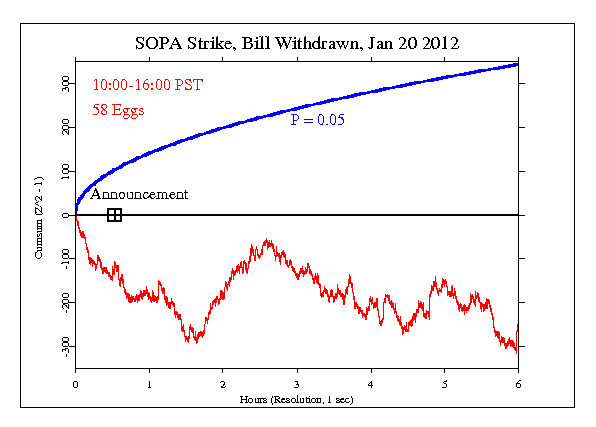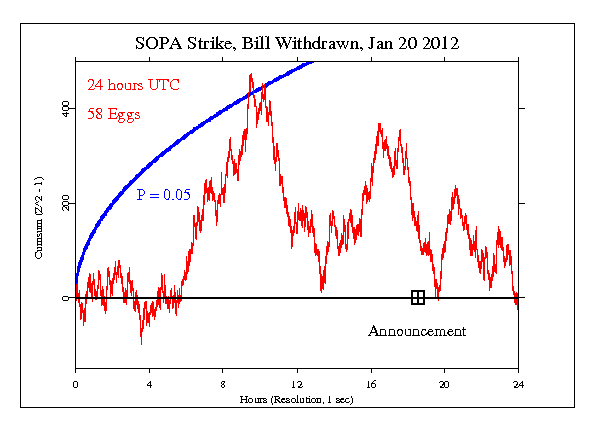Many millions of people were in some way
participants in Wednesday's Web blackout in opposition to the Protect IP
Act (PIPA) and Stop Online Piracy Act (SOPA). I received a note from
Matt Kolasinski suggesting "The Stop SOPA project (SOPA- an overreaching
piece of legislation aimed at online piracy) attracted global attention
and widespread participation.
it's pretty big. I'd expect to see some sort of response in the eggs.
An opportunity to notice any difference in some way of the character
of the event as registered by the eggs.
Indeed it was a big event numerically, though difficult to specify
temporally. I asked Matt for a time period, and he responded with, "The
central event time would be Jan 20, 2012 10:32 AM, or very close to
that, when Associated Press came out with the announcement that the bill
had been withdrawn."
The GCP methodology requires a period of some hours during which a
deviation will be predicted, but this provided a framework.
In stats released last night, Mozilla, the organization behind Firefox,
said it reached 40 million people during Wednesday's blackout, who in
turn sent 360,000 emails to their members of Congress about SOPA and
PIPA.
Mozilla has been taking action against the bills since Nov. 15, when it
emblazoned its site logos with a black "Stop Censorship" banner. But
during the protest, Mozilla blacked out the default start page in
Firefox and redirected key Mozilla Web sites to an action page.
As a result, about 30 million people in the U.S. who use the default
page in Firefox saw the blackout message, Mozilla said in a blog post.
About 1.8 million people came directly to the mozilla.org/sopa site to
learn more. The organization also sent messages to nearly 9 million
people via Facebook, Twitter, and its Firefox newsletter and its
messages were retweeted by more than 20,000 people.
Mozilla joined online protests from Internet bigwigs like Wikipedia,
which blocked its English site all day, and Google, which replaced its
main search page logo with a black bar directing users to an online
petition that garnered at least 7 million signatures.
All that activity appears to have had the desired result. Senate and
House leaders today announced that they would delay action on the
controversial bills. A vote scheduled for next Tuesday in the Senate has
been postponed by Senate Majority Leader Harry Reid, and in the House,
SOPA sponsor Rep. Lamar Smith said the Judiciary Committee would also
postpone action on his bill.
The GCP event was set for a 6 hour period beginning at 10:00 PST, (18:00-24:00
UTC). The result is Chisquare
21351.025 on 21600 df, for p = 0.885 and Z = -1.199.

Since the blackout was going on for a much longer period, it is
interesting to look at the full 24 hours of the 20th, most of which
precedes the GCP event period. The result looks a bit more exciting, but
even as an informal look, it is not statistically persuasive.

It is important to keep in mind that we have only a tiny
statistical effect, so that it is always hard to distinguish
signal from noise. This means that every "success" might be
largely driven by chance, and every "null" might include a real
signal overwhelmed by noise. In the long run, a real effect can
be identified only by patiently accumulating replications of
similar analyses.